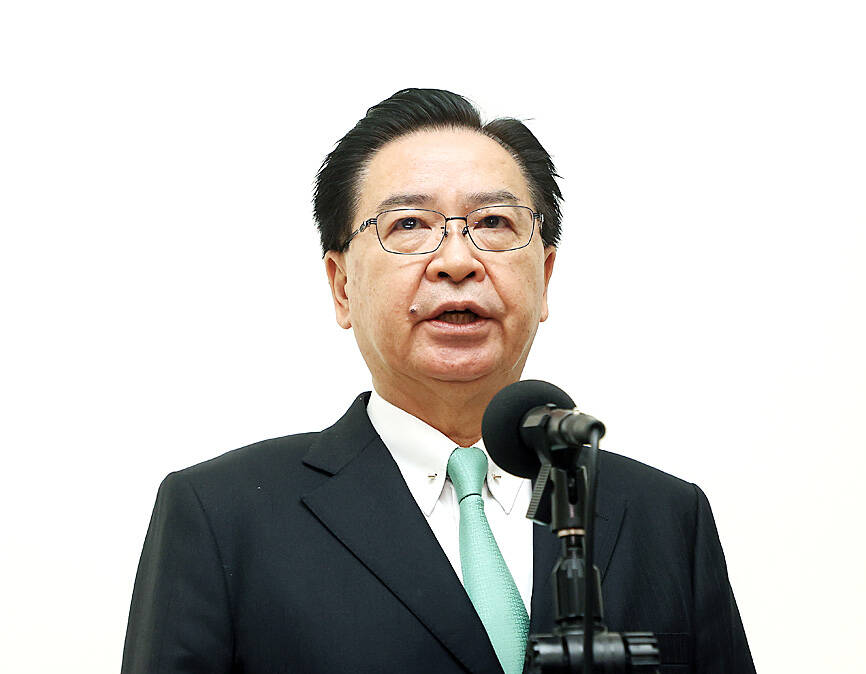Recently passed amendments to a fiscal planning law could reduce the defense budget by 28 percent, undermining the nation’s military readiness and international support for Taiwan, National Security Council (NSC) Secretary-General Joseph Wu (吳釗燮) said yesterday.
Wu, along with Presidential Office Secretary-General Pan Men-an (潘孟安) and Academia Sinica researcher Chen Yi-shen (陳儀深), were among those who spoke at a meeting of the legislature’s Judiciary and Organic Laws and Statutes Committee about the budget.
If promulgated, amendments to the Act Governing the Allocation of Government Revenues and Expenditures (財政收支劃分法) would result in a NT$375.3 billion (US$11.49 billion) reduction of the central government’s budget, the Directorate-General of Budget, Accounting and Statistics said.

Photo: CNA
Other countries in the first island chain have increased their defense spending, such as South Korea, which increased its defense budget by 4.5 percent, while Japan increased its by 16 percent, Wu said.
However, the budget of Taiwan, the nation under the most pressure from China, might be reduced by nearly 30 percent, which would affect military readiness and equipment maintenance, he said.
As other countries evaluate Taiwan’s resolve to defend itself based on the defense budget, cutting it significantly would send the wrong message, suggesting that it has no intention of defending itself, he said.
In that case, no like-minded countries would help Taiwan, he added.
On Dec. 9, foreign media quoted high-level Taiwanese defense officials as saying that China had deployed 90 vessels to the East and South China seas surrounding Taiwan, Wu said.
The reports were confirmed, showing that China had launched large-scale naval training exercises, which demonstrate its ability to mobilize in adverse conditions and simultaneously threaten all nations within the first island chain, meaning that Taiwan must be careful, he said.

The first global hotel Keys Selection by the Michelin Guide includes four hotels in Taiwan, Michelin announced yesterday. All four received the “Michelin One Key,” indicating guests are to experience a “very special stay” at any of the locations as the establishments are “a true gem with personality. Service always goes the extra mile, and the hotel provides much more than others in its price range.” Of the four hotels, three are located in Taipei and one in Taichung. In Taipei, the One Key accolades were awarded to the Capella Taipei, Kimpton Da An Taipei and Mandarin Oriental Taipei. Capella Taipei was described by

The Taichung District Court yesterday confirmed its final ruling that the marriage between teenage heir Lai (賴) and a man surnamed Hsia (夏) was legally invalid, preventing Hsia from inheriting Lai’s NT$500 million (US$16.37 million) estate. The court confirmed that Hsia chose not to appeal the civil judgement after the court handed down its ruling in June, making the decision final. In the June ruling, the court said that Lai, 18, and Hsia, 26, showed “no mutual admiration before the marriage” and that their interactions were “distant and unfamiliar.” The judge concluded that the couple lacked the “true intention of

EVA Airways today confirmed the death of a flight attendant on Saturday upon their return to Taiwan and said an internal investigation has been launched, as criticism mounted over a social media post accusing the airline of failing to offer sufficient employee protections. According to the post, the flight attendant complained of feeling sick on board a flight, but was unable to take sick leave or access medical care. The crew member allegedly did not receive assistance from the chief purser, who failed to heed their requests for medical attention or call an ambulance once the flight landed, the post said. As sick

INDUSTRY: Beijing’s latest export measures go beyond targeting the US and would likely affect any country that uses Chinese rare earths or related tech, an academic said Taiwanese industries could face significant disruption from China’s newly tightened export controls on rare earth elements, as much of Taiwan’s supply indirectly depends on Chinese materials processed in Japan, a local expert said yesterday. Kristy Hsu (徐遵慈), director of the Taiwan ASEAN Studies Center at the Chung-Hua Institution for Economic Research, said that China’s latest export measures go far beyond targeting the US and would likely affect any country that uses Chinese rare earths or related technologies. With Japan and Southeast Asian countries among those expected to be hit, Taiwan could feel the impact through its reliance on Japanese-made semi-finished products and